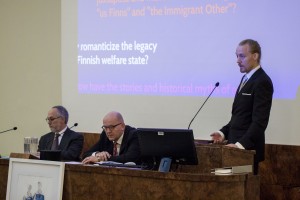Five international Master’s Degree Programmes from the Faculty of Social Sciences and the Faculty of Arts at the University of Helsinki jointly organized an event titled ‘Is there life after graduation?’ The event was targeted at both current students and alumni, and the aim was to discuss career prospects after graduation. The event was held at Think Corner at Aleksanterinkatu on the 17th of September.
The event offered students a great chance to get tips for job-hunting and to hear about the career developments of the similar-field graduates. The happening started with a panel discussion, where four alumni speakers told about their careers and shared the secrets of their success in the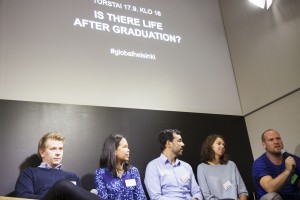 labour market. The panel speakers represented both academia, the private sector and NGOs. Afterwards, the students had the chance to ask questions and mingle with the alumni. Altogether more than 50 students and alumni took part in the event. The participants of the panel were Meg Sakilayan-Latvala (ERI), Daria Krivonos (REMS), Jan Westö (MES), Chris Denholm (MGC) and Carlos Mendoza (ICE). John Hills, a current ICE student, was the moderator of the discussion.
labour market. The panel speakers represented both academia, the private sector and NGOs. Afterwards, the students had the chance to ask questions and mingle with the alumni. Altogether more than 50 students and alumni took part in the event. The participants of the panel were Meg Sakilayan-Latvala (ERI), Daria Krivonos (REMS), Jan Westö (MES), Chris Denholm (MGC) and Carlos Mendoza (ICE). John Hills, a current ICE student, was the moderator of the discussion.
All alumni highlighted right from the beginning the importance of networking in getting a job. It was mentioned that social scientists need to change their mindset regarding possible employments as there are no guaranteed jobs for master’s degree graduates. According to Jan Westö, this means in practice being open-minded instead of picky. It was added that it is necessary to “go out from your comfort zone” and bravely sell your specific skills to the potential employers. Carlos Mendoza suggests everyone to think from the perspective of the employer: how can I as a possible employee contribute to the company or organization? What do I have to offer that others don’t? Daria Krivonos, who at the moment works with her PhD research, also recommends networking for those who are planning the academic career. It is crucial to know the hot research topics and other researchers in your own field.
When asked about the special skills and advantages of the social scientists in the labour market, all panelists agreed that the analytical skills are something that they have to offer. They are able to independently observe and criticize also topics that are not their particular expertise. Finnish language requirements, moreover, raised a lot of questions among the international audience, and the message of the panelists was clear. Meg Sakilayan-Latvala’s work requires spoken and written skills in Finnish and according to her, it is important to show interest in learning the language. In the beginning the language skills do not necessarily have to be so good, but at least you should not be passive about it. Chris Denholm also reminds that being a non-native Finnish speaker should be taken as an advantage in all possible cases. Sell your native-language skills!
The audience was also interested in internships and their importance, so the alumni gave tips for searching for a proper place. The panelists underlined the importance of (besides networking) knowing the organization or company of the possible internship or work place. By making research beforehand and going to the events the applicant can make a good impression. Howev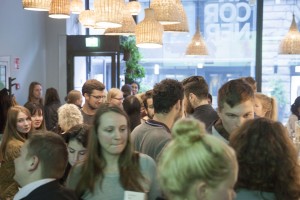 er, it was stated that the employer will notice if the applicant lies or exaggerates about his/her skills or do not put enough effort into the application. In the end, the alumni panelists encouraged the students to think about the possible work “outside of the box” as there are more doors open than you never thought would be there for you.
er, it was stated that the employer will notice if the applicant lies or exaggerates about his/her skills or do not put enough effort into the application. In the end, the alumni panelists encouraged the students to think about the possible work “outside of the box” as there are more doors open than you never thought would be there for you.
Written by Ulla-Kaisa Pihlaja
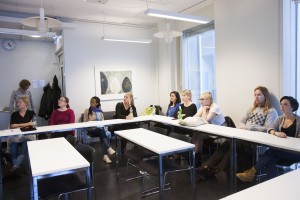 brated its new profile with a new major subject, Social and Cultural Anthropology. Representatives from the other major subjects, Social Psychology and Sociology, were also present to introduce themselves to both old and new ERI students. The disciplines were represented by Karmela Liebkind from Social Psychology, Sarah Green from Social and Cultural Anthropology and Aino Sinnemäki from Sociology. Sirpa Wrede, Professor of Ethnic Relations, participated in the event also as a representative of Sociology. Throughout the disciplinary presentations the speakers underlined the importance and usefulness of the multidisciplinary character of the ERI studies. It is valuable to understand both during the studies and later in work life how issues can be approached from different perspectives. It is challenging to attend courses from another discipline than your own, but students should remember that they are not expected to become a specialist in them. Let yourself be inspired and challenged by different disciplinary approaches while becoming an expert in your own major! Afterwards students and staff were offered a chance to mingle over a g
brated its new profile with a new major subject, Social and Cultural Anthropology. Representatives from the other major subjects, Social Psychology and Sociology, were also present to introduce themselves to both old and new ERI students. The disciplines were represented by Karmela Liebkind from Social Psychology, Sarah Green from Social and Cultural Anthropology and Aino Sinnemäki from Sociology. Sirpa Wrede, Professor of Ethnic Relations, participated in the event also as a representative of Sociology. Throughout the disciplinary presentations the speakers underlined the importance and usefulness of the multidisciplinary character of the ERI studies. It is valuable to understand both during the studies and later in work life how issues can be approached from different perspectives. It is challenging to attend courses from another discipline than your own, but students should remember that they are not expected to become a specialist in them. Let yourself be inspired and challenged by different disciplinary approaches while becoming an expert in your own major! Afterwards students and staff were offered a chance to mingle over a g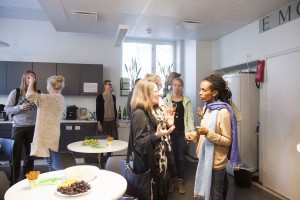 lass of wine.
lass of wine.


